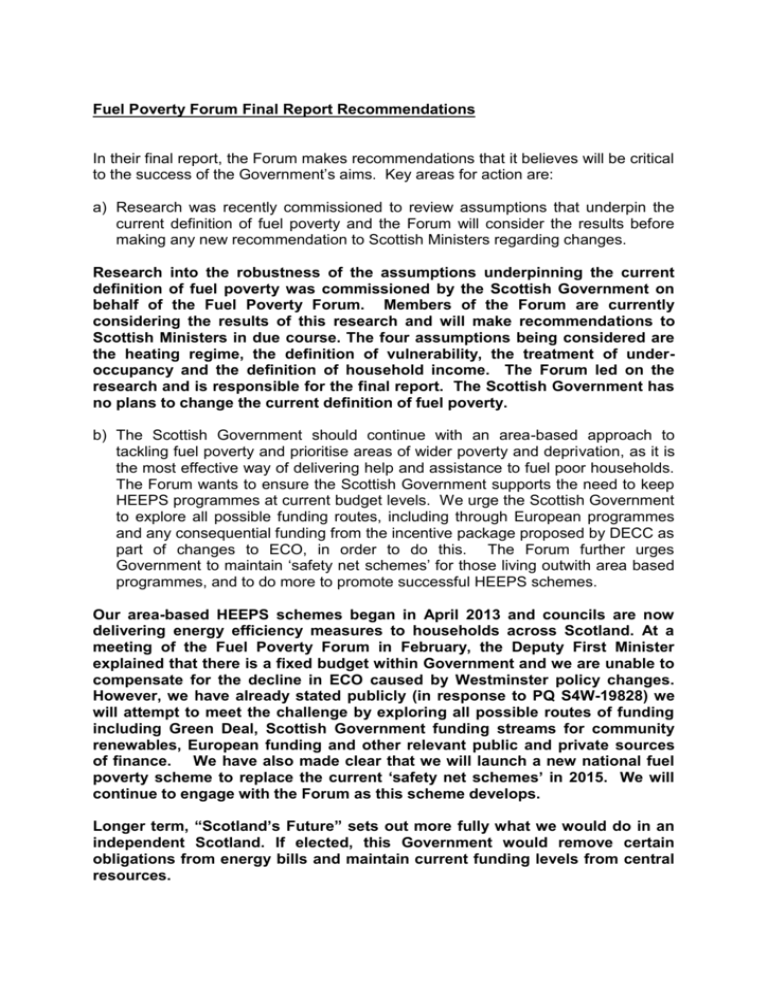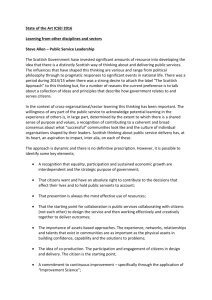Fuel Poverty Forum Final Report Recommendations In their final
advertisement

Fuel Poverty Forum Final Report Recommendations In their final report, the Forum makes recommendations that it believes will be critical to the success of the Government’s aims. Key areas for action are: a) Research was recently commissioned to review assumptions that underpin the current definition of fuel poverty and the Forum will consider the results before making any new recommendation to Scottish Ministers regarding changes. Research into the robustness of the assumptions underpinning the current definition of fuel poverty was commissioned by the Scottish Government on behalf of the Fuel Poverty Forum. Members of the Forum are currently considering the results of this research and will make recommendations to Scottish Ministers in due course. The four assumptions being considered are the heating regime, the definition of vulnerability, the treatment of underoccupancy and the definition of household income. The Forum led on the research and is responsible for the final report. The Scottish Government has no plans to change the current definition of fuel poverty. b) The Scottish Government should continue with an area-based approach to tackling fuel poverty and prioritise areas of wider poverty and deprivation, as it is the most effective way of delivering help and assistance to fuel poor households. The Forum wants to ensure the Scottish Government supports the need to keep HEEPS programmes at current budget levels. We urge the Scottish Government to explore all possible funding routes, including through European programmes and any consequential funding from the incentive package proposed by DECC as part of changes to ECO, in order to do this. The Forum further urges Government to maintain ‘safety net schemes’ for those living outwith area based programmes, and to do more to promote successful HEEPS schemes. Our area-based HEEPS schemes began in April 2013 and councils are now delivering energy efficiency measures to households across Scotland. At a meeting of the Fuel Poverty Forum in February, the Deputy First Minister explained that there is a fixed budget within Government and we are unable to compensate for the decline in ECO caused by Westminster policy changes. However, we have already stated publicly (in response to PQ S4W-19828) we will attempt to meet the challenge by exploring all possible routes of funding including Green Deal, Scottish Government funding streams for community renewables, European funding and other relevant public and private sources of finance. We have also made clear that we will launch a new national fuel poverty scheme to replace the current ‘safety net schemes’ in 2015. We will continue to engage with the Forum as this scheme develops. Longer term, “Scotland’s Future” sets out more fully what we would do in an independent Scotland. If elected, this Government would remove certain obligations from energy bills and maintain current funding levels from central resources. c) The Forum remains concerned by the number of fuel poor households who live remote from the gas grid and who are reliant on electricity and other fuels, such as oil, for their primary heating source. These households need to be better served by HEEPS schemes. We recognise that delivery of energy efficiency measures through ECO is often difficult in rural areas – and we have raised this issue with DECC. In Scotland, this has been the case in some rural areas, but not all. For example, HEEPS: ABS schemes are currently running in rural areas such as the Western Isles, Dumfries & Galloway and Argyll & Bute. And we should recognise that the statistics released by DECC demonstrate that energy efficiency measures are being installed in Scotland under ECO, with over 58 000 measures installed between January and December 2013. That said, there are still issues with some remote and island areas as it is more expensive for utility companies to fund energy efficiency measures in such areas than it is in urban areas. The companies will therefore concentrate their activity where it is most cost effective to meet their obligations. The Scottish Government is currently working with stakeholders to ensure our funding continues to tackle fuel poverty. In March we announced £60 million of funding to local authorities to ensure Scottish households can receive the energy efficiency measures they need to live in warm, affordable homes. This £60 million will be distributed across Scotland, including our rural and island areas and will include specific provision to assist households in off-gas grid areas currently finding it difficult to get funding for measures. Scottish Government officials and representatives from the Fuel Poverty Forum are also participating in several UK Government ‘Off Gas Grid’ working groups to ensure that UK wide policy development meets the needs of Scottish off gas grid consumers. d) Scottish Government must build on the success of current schemes to tackle harder to treat properties. There is also a need to recognise that the barriers to the installation of measures are often social rather than technical. Providing the wider support will improve the success of programmes. Scottish Government is constantly striving to build on the success of existing schemes. Our current HEEPS guidance is clear on what we expect councils to deliver and we expect our funding to specifically support delivery of hard to treat measures such as Sold Wall Insulation. We have also increased the level of enabling funding councils can access via HEEPS by £3m to overcome social barriers to delivering measures. We will continue to work with the Forum on this going forward. e) The Scottish Government should, as a matter of urgency, improve the quality of existing reporting systems intended to monitor HEEPS programmes and the effectiveness of the measures they deliver. Current mechanisms do not provide the transparency needed to inform future improvements. The Scottish Government has reviewed the reporting structures and presented proposals for revised reporting frameworks to the Fuel Poverty Forum. These were agreed by the Forum in February. f) The Scottish Government must be clearer on how it will develop firmer links between fuel poverty measures and health or other social benefits. Trusted intermediaries are needed to help address the issue of hard to engage households. By fostering better links, vulnerable households can be encouraged to take up the most advantageous measures as well as being taught to use the equipment and controls to best effect. This is an area we are keen to explore more. We are actively looking for a health representative to take up membership of the Forum. In addition, Fuel Poverty officials are engaging with Health and Welfare colleagues to explore further ways to join up these policy areas this has already assisted in establishing contact with the Deep End practices through the Link worker programme – a Scottish Government funded scheme that is exploring how GP practices and local community resources can work together more closely to support people who are living in complex social circumstances. g) The Scottish Government should explore ways of increasing participation of SME companies in delivering measures through the HEEPS schemes. Local employment, providing green jobs, was a key objective in the Forum’s interim recommendations. So far, this has met with a low level of success, particularly in rural areas, and those firms seeking to undertake the necessary up-skilling of their labour force have found the costs prohibitive. On May 9th we announced £15m of funding for a further phase of our Green Homes Cashback Scheme. This provides grants to householders for up to £7300 to contribute toward the installation of energy efficiency measures in their homes based on a Green Deal Assessment. Provision is also made for social landlords to access the scheme. This not only raised the profile of Green Deal but provided a market place for assessors and installers, which encouraged them to undertake the upskilling and certification required to participate in the Green Deal delivery market. We also facilitate the upskilling through our Low Carbon Skills Fund. h) The Scottish Government should promote the uptake of incentives to establish community owned renewable energy assets, in deprived areas, where the income could help fund measures to alleviate fuel poverty. The Scottish Government’s Warm Homes Fund supports the development and implementation of renewable energy schemes, which will reduce fuel poverty by improving the energy efficiency of houses and/or by providing affordable warmth. Funding is provided to registered social landlords (RSLs) and local authorities (LAs), as well as energy services companies (ESCOs) set up by RSLs and LAs, whose projects are helping to heat homes across Scotland. It focuses on communities worst hit by higher fuel prices and projects that will see significant reduction in their energy bills. We also have our CARES “Community Buildings” grants scheme which is specifically designed to incentivise ownership of community energy assets in deprived areas. It offers up to 90% of the costs of eligible renewable energy installations in community buildings and 100% of technical energy studies. We have recently extended the scheme from urban deprived areas to any deprived area. i) The Scottish Government should increase its efforts to establish heat networks. In Aberdeen such assets have made a considerable contribution to the eradicating of fuel poverty by providing affordable community heat. Proposed changes to ECO, currently out to consultation, would make district heating installations a primary ECO measure, and therefore provide an opportunity to grow heat networks. We are setting targets for district heating and propose these are set at: an overarching target of 1.5 TWh of heat to be delivered to households, business and industry and the public sector by district heating by 2020; a target of 40,000 homes to be supplied with affordable low carbon heat through district heating and communal heating by 2020. We are investing £10.5 million over the two years 2014 to 2016 to develop heat policy, including £8 million for our District Heating Loan Scheme. j) The Forum would wish to review the costs and benefits of collective switching after all Ofgem’s reforms following the Retail Market Review are in place. The Scottish Government will work with the Fuel Poverty Forum to review the collective switching options once RMR is in place. k) In its interim report the Forum commented on the relationship between health, fuel poverty and excess winter deaths. This relationship is not fully understood statistically or scientifically and the Scottish Government agreed to undertake research. The Forum recommends Scottish Ministers take further action to move forward the understanding of this issue. Health representation on the Forum would assist the group to explore this issue in more depth as will the ongoing work with Scottish Government Health and Welfare colleagues. Scottish Government will work with the Forum to agree the most appropriate route to take this work forward. l) The Forum previously recognised the potential for the Green Deal to make a contribution to the success of Scottish energy efficiency programmes. Green Deal is a funding mechanism that can be utilised by those who are ‘able to pay’ and the Forum acknowledges it is not recommended as a funding route for the fuel poor or those who under heat their homes. Nonetheless we believe that the Scottish Government should build on the good examples of the Green Deal already working in Scotland to help the scheme mature. Scottish Government is committed to ensuring that all funding routes are explored to fund energy efficiency measures. On May 9 th we announced £15m of funding for a further phase of our Green Homes Cashback Scheme. This provides grants to householders for up to £7300 to contribute toward the installation of energy efficiency measures in their homes based on a Green Deal Assessment. Provision is also made for social landlords to access the scheme. This not only raised the profile of Green Deal but provided a market place for assessors and installers, which encouraged them to undertake the upskilling and certification required to participate in the Green Deal delivery market. In Scotland’s Future we have made our position clear on the Green Deal and that we propose that schemes that are in place immediately before independence, such as the Green Deal, will be inherited by an independent Scotland








